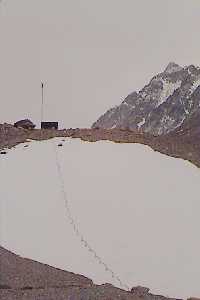 And my instrument, the aethalometer in its box looking like Stanley Kubrick's
inspiration, my aethalometer is sitting on a hillock aways from the camp
building on the end of a thousand-foot cable.
And my instrument, the aethalometer in its box looking like Stanley Kubrick's
inspiration, my aethalometer is sitting on a hillock aways from the camp
building on the end of a thousand-foot cable.
The Farthest End Of The World's Wires
I am here. I am at the very farthest split end of the world's wires, a 1200-baud thread in a T1 world. A helo ride, a tiny plywood building in a vast landscape of crushed rock, but there's a solar panel array that provides a squeak of voltage, a radio phone back to McMurdo with a modem that can be used for text in the evening, this is as far as the modern world stretches.
I am at the end of civilization's immediate reach.
 And my instrument, the aethalometer in its box looking like Stanley Kubrick's
inspiration, my aethalometer is sitting on a hillock aways from the camp
building on the end of a thousand-foot cable.
And my instrument, the aethalometer in its box looking like Stanley Kubrick's
inspiration, my aethalometer is sitting on a hillock aways from the camp
building on the end of a thousand-foot cable.
The helicopter ride was too smooth, too quiet, uneventful,
less inspiring than I had expected. We passed over the ice of McMurdo
Sound as if swimming over a white-sand sea bottom.
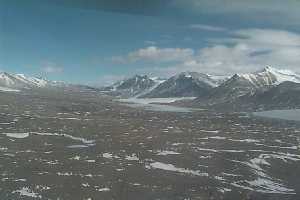
But then after maybe twenty minutes we approached
the entrance to the Dry Valleys. It was phenomenal: the sky
here was blue rather than cloudy, the mountains gleamed on either side
as we passed over a giant gravelly world flecked with unmelted patches
of snow.
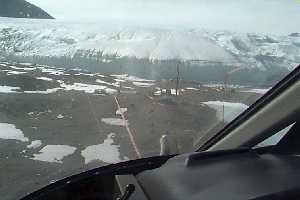 The
first lake - Fryxell - was closer to the coast than I had expected.
Beyond it, the tongue of the Canada Glacier flowed into the valley, ending
in an abrupt round wall of blue ice. And as the helo flew over to
the farther side, there was the tiny cluster of buildings that were my
destination, nestled between the glacier, the ice-covered surface of Lake
Hoare, and the scree wall of the mountains to the north.
The
first lake - Fryxell - was closer to the coast than I had expected.
Beyond it, the tongue of the Canada Glacier flowed into the valley, ending
in an abrupt round wall of blue ice. And as the helo flew over to
the farther side, there was the tiny cluster of buildings that were my
destination, nestled between the glacier, the ice-covered surface of Lake
Hoare, and the scree wall of the mountains to the north.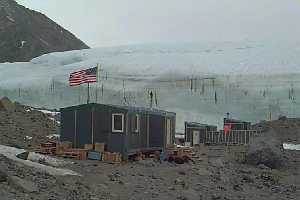
"Your baggage has been checked through to your final
destination"
Inside, the station reminded me very much of a slightly-larger
version of our cabin in the Santa Cruz mountains: one large room with a
divider, a kitchen and eating area, a stove, the comfortable paraphernalia
of everyday life away from the city.
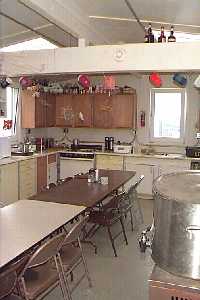
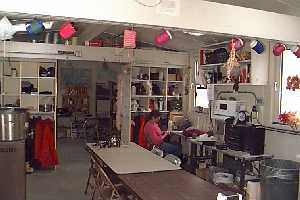
And the instructions were the same.
"We get all our water by melting ice in the pot on the
stove, so use it sparingly.
"There's an outhouse for solid waste, and a barrel for
liquid waste (this turned out to be different)
"Minimize your use of electrical power and turn off everything
you don't need
"Wash dishes in just an inch of water till it's really
gray, then rinse in another inch
All of this was very familiar - the same strictures that apply anywhere off the grid, off the pavement.
The station building has that slight whiff of propane
or heating oil, outdoor clothes on hooks, folding metal chairs, piles of
boots and tables with oddments of technical equipment.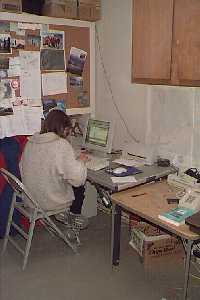
But the amazing thing is that there's a computer on a
metal table, and the computer is connected to a radio modem, and the radio
goes to McMurdo in the evenings, (daytimes it's used for comms), and McMurdo
goes to the rest of the world .........
and I can squeak out a 2-line e-mail to tell Cindy and
Christopher that I've arrived safely.
I stare at this illusion, a man working at a spreadsheet,
analyzing the algae.
I look outside again.
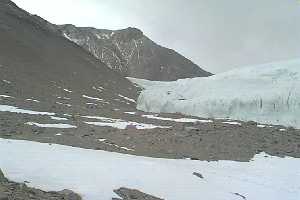
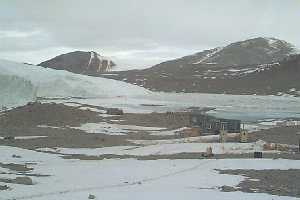
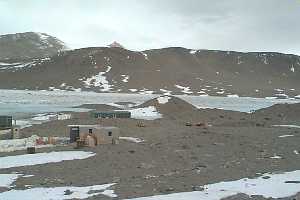
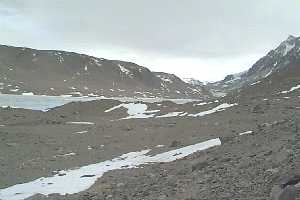
The Lake Hoare Camp is on a patch of rocks and gravel,
next to a blue-white glacier, next to an ice-covered lake, in a valley
that stretches to infinity and whose slopes will never be subdivided.
Every rock is exactly where it was a hundred years ago when Scott's and
Shackleton's explorers passed through. It hasn't rained here for
at least two million years. Nothing exists to make anything change
other than the blast of wind or the inexorable creep of frost. Nothing
grows. Nothing moves except ice. 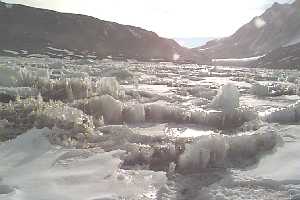 The
lake surface freezes and thaws in patterns and spires that remind me of
the tufa formations at Mono Lake.
The
lake surface freezes and thaws in patterns and spires that remind me of
the tufa formations at Mono Lake.
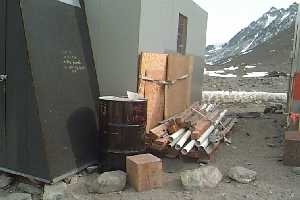 Back
at the camp, I visit the "men's-room facility". It consists of a
black-painted U-barrel equipped with a funnel and a wooden block to stand
on. Stand close, brothers, it's cold.
Back
at the camp, I visit the "men's-room facility". It consists of a
black-painted U-barrel equipped with a funnel and a wooden block to stand
on. Stand close, brothers, it's cold.
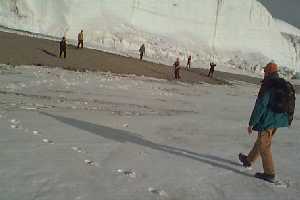
The wind subsides, the sun comes out and is surprisingly
hot. As if responding to a rare event, several of the camp residents
run to the "beach" with their frisbee. Their bare feet scuffle the
sand, they laugh and chase and play. The beach is a patch of sand
between the glacier and the frozen surface of the lake, but for the moment
it could be the cliffs of Santa Cruz.
Once again, I wonder. Where the hell am I?
Why is all of Antarctica like this? Is it simply the place
that is goofy? or is it our overlay of civilization? or is
it me?- is it me that stumbles into these places, or looks
at them this way?
If there was one cow-pat in Antarctica, am I
the person who would step in it?